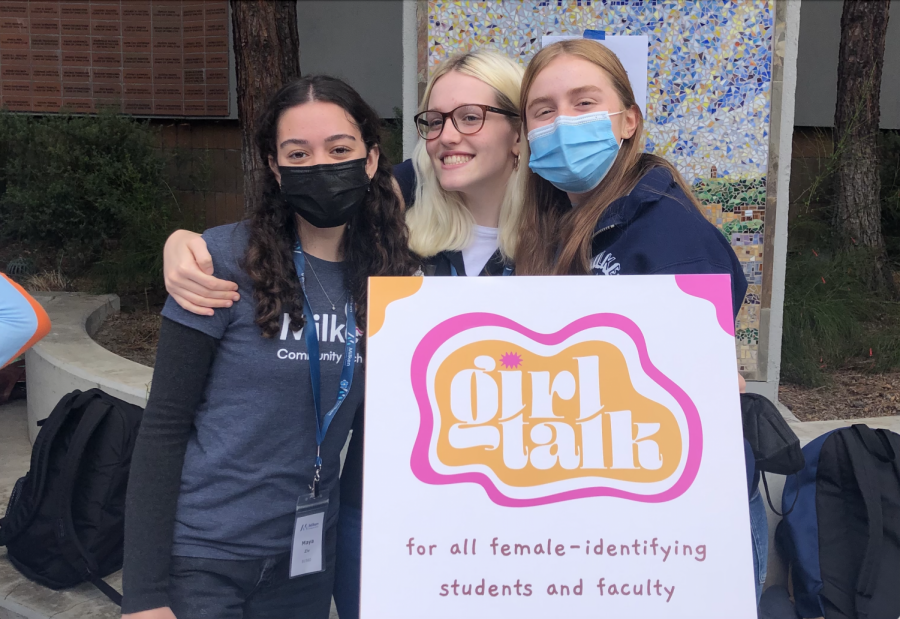Girl Talk: Inside Milken’s Safe Space for Female-Identifying Students and Faculty
Eden Sweet (‘22), Girl Talk’s Senior Head, Maya Ziv (‘23), one of Girl Talk’s Junior Heads, and Kate Behrman (‘23), a member of the Planning Committee, recruit new Girl Talk members at the Club Fair.
The first Girl Talk session Maya Ziv attended was called Words of Wisdom, and it was a time for seniors to give advice to freshmen about academics, social situations, and extracurricular activities. Room 3-105 was buzzing with freshman curiosity and the seniors were eager to share their insight. A desk in the back of the room was laden with chocolate-chip challah and grapes, and the room welcomed new students into the Milken community. Everyone sat in circles on the floor, making people feel like equals, no matter what grade they were in. It felt like you were being talked to instead of talked at.
“I stepped into that room and it didn’t matter that we were all in different grades or that I was a freshman,” Ziv said. “I was talking to seniors and everyone was just integrated and talking to one another. It was a very safe space.”
Girl Talk is a student-run club for female-identifying students and faculty at Milken. The group facilitates discussions, panels, and creative projects based on women’s issues, as well as topics that many different kinds of people are passionate about. The club meets at Oneg about once a month. It requires no commitment and you can just drop into one session, or attend every session. My first Girl Talk session was in ninth grade. I attended the session on Femininity, and I was immediately welcomed into a safe space to share my ideas. However, I also did not feel pressure to share anything I was not comfortable with sharing.
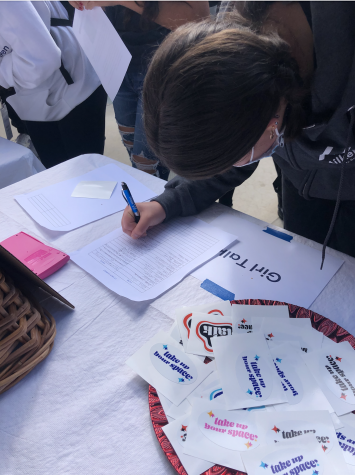
Every Girl Talk session starts out with the same statement: “Girl Talk is a safe space.” Why is there a need for a safe space at Milken? Because women’s rights are often politicized in the news and on social media, it makes it harder for people to openly speak their minds about their experiences as women at Milken, on social media, and in society as a whole. Oftentimes when people try to speak about issues like workplace discrimination or the gender pay gap at school, some people immediately reject those ideas and call them illegitimate. If someone has dealt with sexual assault or online discrimination, they may be afraid to talk about their experiences for fear of people using a political position to belittle their suffering. All political views are welcome in Girl Talk and everyone comes into this space being open to hearing other opinions. You will not be shut down or silenced. Instead, you will be encouraged to take up space.
One junior, Shayna Schreiber, said that in many spaces she feels comfortable talking about women’s issues but also notes that often “people are too quick to judge based on what you have to say.”
Another student, junior Nicole Diner, said “I get a lot of repercussions from a lot of people. A lot of people are mean.” She explained that “Usually, it’s because…I tend to go for the more liberal side.”
Even the word “feminism” is a buzzword for many Milken students, and it sends them into a long political rant. Why should women’s issues be exclusively discussed in the same conversations we have about climate change, taxes, and gun control? It is important for there to be a safe space at Milken that allows female-identifying people to discuss their experiences without them being equated to a certain political view.
Last school year, Girl Talk sessions were held on Zoom. One session held last year was the Women in Power Panel with Dr. Shulkind, Mrs. Terk, Dr. Schwartz, and Ms. Guth. The panelists talked about their experiences as women who hold positions of power. The planning committee posed questions like: “As a powerful woman, what do you feel is your responsibility to other young females?”
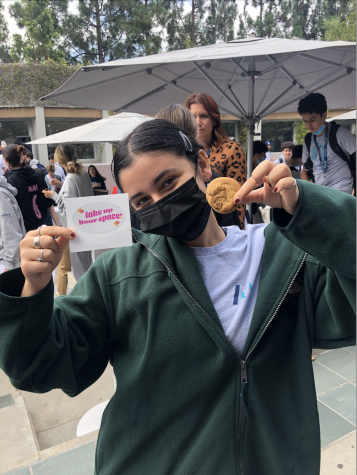
For Ziv, one of Girl Talk’s Junior Heads, “It was such a casual way to bring together a female community at Milken.” Recognizing the fact that you have shared experiences with your Head of School and a history teacher strengthens the Milken community as a whole.
Although discussions are a big part of Girl Talk, there are also sessions that are more relaxing. Last year on Zoom they held a session in which participants colored and listened to music together. Creating a space for students to relax in the middle of a busy school day, even on Zoom, is a great way to strengthen community. It is easy to have casual conversations and get to know people better.
Now in a leadership role in Girl Talk, Ziv is focusing on “maximizing the impact that Girl Talk has on the rest of the school.” Last year Girl Talk held sessions that were open to everyone at school. Since “a lot of our talks would be beneficial for more than just the female-identifying students and faculty to hear,” Ziv enjoyed hosting these sessions in collaboration with other clubs like the Gender and Sexualities Alliance, as well as independent Girl Talk events. Ziv finds that in Girl Talk discussions she hears “so many different perspectives of people that come for the first time or people that come to all of our sessions,” and it really contributes to a safe space at Milken.
Girl Talk allows people to be more open. “I feel safer in [Girl Talk] because even though there can be a difference of opinion, I know everyone’s still there to support each other,” Shayna Schreiber said. Allowing room for constructive discussions, while still making everyone feel like their opinions and experiences are valid is very important in Girl Talk.
It is also important to discuss ways to take action. In the upcoming school year, Diner wants to “talk about how the school deals with sexism and racism at school, and find a way to make it better.”
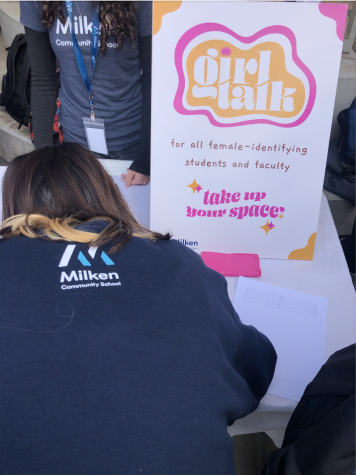
Every Girl Talk session is created by the Planning Committee, with guidance from faculty advisors Rabbi Shawn Fields-Meyer and Ms. Jessica Jackson. In tenth grade, I joined the Planning Committee and started planning Girl Talk’s Zoom sessions. A lot of what we wanted for our discussions was to hear multiple perspectives and not feel like we were sitting in an “echo chamber.” In Girl Talk, I learned how to listen to different opinions without immediately feeling like I needed to make my perspective known. Even if they do not feel comfortable sharing their own ideas, I think every female-identifying student and faculty member at Milken should come to a session to hear what other people have to say.
Students can contact anyone on the Girl Talk Planning Committee: Brooke Abselet, Kate Behrman, Ilana Frid-Madden, Miriam Herstein, Noa Karidi, Ayla Kattler, Eden Sweet, Maya Ziv, Rabbi Shawn Fields-Meyer, or Ms. Jackson for any questions or to sign up to be on the email list.
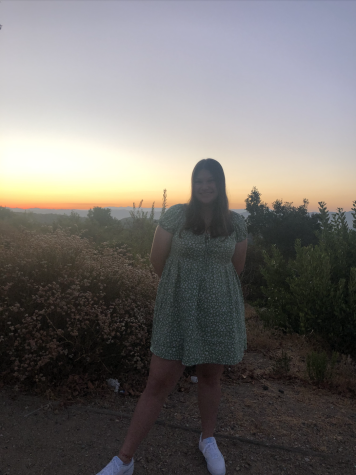
Miriam Herstein, The Roar’s Deputy Editor, is a senior at Milken who has been in Journalism for two years. While she enjoys writing about student clubs,...



